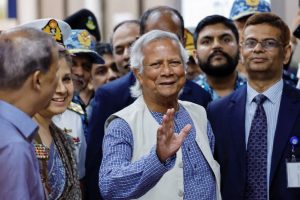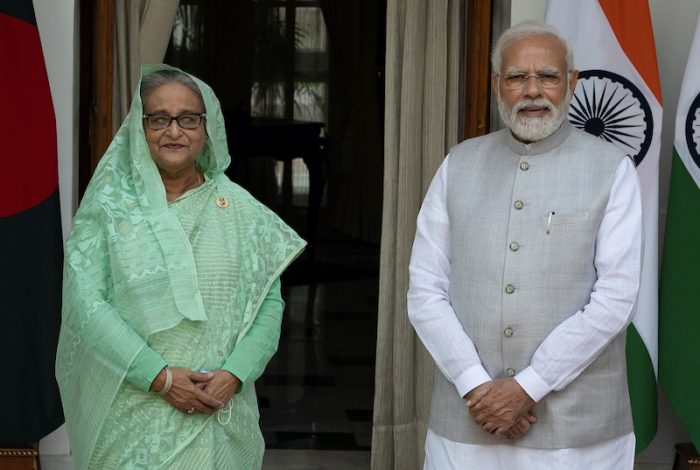The new head of Bangladesh’s central bank has alleged that “about $17 billion was siphoned from the country’s financial system” in the 15 years the Sheikh Hasina government ruled the country, according to a report by the New York Times.
But that estimate may be conservative, as other economists had estimated “the true value looted during Ms Hasina’s rule, before she fled the country [in August], could exceed $30 billion,” the report published on December 4 said.
That allegation was made by Ahsan Mansur, a former long-term IMF official who was appointed as central bank governor by the interim government headed by Muhammad Yunus, the Nobel Prize-winning economist who won acclaim for his microfinance lending schemes to the country’s many poor citizens.
ALSO SEE: China’s CATL, Stellantis Confirm $4.3bn EV Battery Plant in Spain
Mansur alleged that, during Hasina’s time in power – from 2009 to August this year – the country’s political leaders were able to gain control of the central bank and a group of private banks by stacking directors on their boards.
“The banks then issued billions of dollars in loans to companies, some of them fictional, that would never be paid back. Much of that money was then transferred out of the country illegally,” the report said, adding that Mansur described this as “systematic robbing of the banks.”
The interim government has said it will seek to extradite Ms Hasina, who fled in India in August after a protest movement which spiralled into mob violence.
‘Thousands forcibly disappeared’
Charges over the financial allegations are yet to be filed. But there are potentially far more serious probes going on into the large number of people said to have ‘disappeared’ and possibly slain during Hasina’s time in office.

Yunus said in mid-November, that about 1,500 people died in protests that brought down the former prime minister in August – and that as many as 3,500 may have been forcibly abducted during her 15-year rule.
A commission investigating the violence before Hasina fled had found information on 1,600 cases of forced disappearance as of October, he said, according to Reuters.
Human Rights Watch said in a report in 2021 that according to Bangladeshi human rights groups, nearly 600 people have been forcibly “disappeared” by security forces since 2009.
It verified 86 enforced disappearances cases in which the fate of the victims remains unknown. Others were freed, shown as arrested or found dead, it said.
These claims have, not surprisingly, stirred a hornet’s nest.
Hasina hit back this week, claiming that Muhammad Yunus was the “mastermind” of a “meticulous conspiracy” behind the student protests that led to her being ousted from power.
Hasina said on Monday she had been replaced by “a fascist government” and that “the whole of Bangladesh is burning… is being destroyed,” according to a report by India’s Business Standard.
Readers can make up their own minds about those accusations, but there have been credible reports that some Indian media outlets have embarked on an aggressive misinformation campaign aimed at discrediting the interim government in Bangladesh, according to The Diplomat.
Hasina should be extradited, Dhaka tells India
Meanwhile, senior officials from India and Bangladesh held talks on Monday in a bid to cool the waters after months of tension, with protests and confrontations since Hasina was ousted.
Indian Foreign Secretary Vikram Misri travelled to Dhaka in the highest-level mission between the neighbours and trade partners since August, Reuters said.
After Hasina’s exit, India complained about what it said were targeted attacks on minority Hindus in Muslim-majority Bangladesh. But Yunus, who met Misri on Monday, said the reports were exaggerated.
Yunus “asked India to help clear the ‘clouds’ that have cast a shadow over the relationship between the two neighbours in recent times,” according to a statement from his office.
“India desires a positive, constructive, and mutually beneficial relationship with Bangladesh,” Misri was quoted as saying in a transcript published by the Indian foreign ministry after the meeting.
Misri said he discussed “some regrettable incidents of attacks on cultural, religious, and diplomatic properties”, adding that India expected a constructive approach on these issues from Bangladesh.
He also met his Bangladeshi counterpart, Mohammad Jashim Uddin.
Bangladesh has denied reports of attacks, and asked India to stop sheltering Hasina and demanded her extradition.
- Jim Pollard with Reuters
NOTE: A picture of Muhammad Yunus and further details were added to this report on December 10, 2024.
ALSO SEE:
Bangladesh Wants Legal Help For Probe Into Adani, Power Deals
Jubilation in Dhaka After Sheikh Hasina Resigns, Flees Bangladesh
Key Bangladeshi Bank Freezes Myanmar Regime Accounts
Bangladesh Agrees $4.5 Billion Bailout Deal With IMF
Bangladesh Protests Break Out After 52% Fuel Price Rise
IMF Receptive to Bangladesh Request for $4.5bn Loan
Deft handling of giant neighbours helps lift Bangladesh, South Asia’s rising star
























